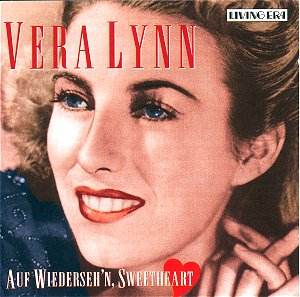 CD Reviews
CD Reviews MusicWeb
Webmaster: Len Mullenger
Len@musicweb.uk.net
[Jazz index][Purchase CDs][ Film MusicWeb][Classical MusicWeb][Gerard Hoffnung][MusicWeb Site Map]

VERA LYNN
Auf wiedersehín, Sweetheart, 25 original mono recordings 1936-1952
![]() ASV
LIVING ERA CD AJA 5464 [77:11]
ASV
LIVING ERA CD AJA 5464 [77:11]
Crotchet Budget price
A Nightingale sang in Berkeley Square (June 5, 1940) (1)
A Star fell out of Heaven (August 17, 1936) (2)
Moonlight on the Waterfall (October 18, 1937) (3)
Harbour Lights (March 10, 1937) (4)
The Bells of St. Maryís (April 6, 1938) (5)
In my Little Red Book (April 6, 1938) (6)
Two Sleepy People (December 9, 1938) (7)
Mexicali Rose (April 26, 1939) (8)
Iím in love for the last time (February 6, 1940) (9)
Itís a lovely day tomorrow (February 17, 1940) (10)
Whoís taking you home tonight? (March 21, 1940) (11)
That Lovely Weekend (January 23, 1942) (12)
The Anniversary Waltz (May 19, 1942) (13)
When the lights go on again (November 11, 1942) (14)
Be like the kettle and sing (December 16, 1942) (15)
Iím yours sincerely (December 16, 1942) (16)
My dreams are getting better all the time (April 14, 1945) (17)
Iím beginning to see the light (June 13, 1945) (18)
Coming Home (June 13, 1945) (19)
And Love was Born (November 20, 1951) (20)
Cry (November 20, 1951) (21)
The Homing Waltz (July 17, 1952) (22)
Yours (July 17, 1952) (23)
Forget-me-not (September 2, 1952) (24)
Auf wiedersehín Sweetheart (April 30, 1952) (25)Vera Lynn (vocalist), with Denny Dennis (vocalist) (7), orchestral accompaniment (1), Charlie Kunz (piano) and his Casani Club Orchestra (2), Bert Ambrose and his Orchestra (3, 7, 9), Arthur Young (Novachord) (4, 8, 10, 11), Rae Jenkins and his Quartet (5, 6), Members of the Ambrose Orchestra (8, 10), Mantovani and his Orchestra (12-16), her own orchestra/Len Edwards (17-19), Roland Shaw and his Orchestra (20-25), Sailors, Soldiers and Airmen of Her Majestyís Forces (22-25)
Locations not given, dates as above
Vera Lynn (born Vera Margaret Welch in 1917) is perhaps best recognized as Englandís number one morale builder during the Second World War. She will certainly be immortalized by such hits as The White Cliffs of Dover, Wishing, and Weíll Meet Again. But beyond being an inspiration to the British Expeditionary Force, she must certainly be credited with being one of the most sincere and artistic popular singers of the twentieth century. Now into her eighties, the sweetheart of wartime England still makes the occasional public appearance, and was honored by Queen Elizabeth by being created DBE in 1976.
This collection of twenty-five of her earlier hit records comes to life quite well under the skilled hands of Peter Dempsey, who has lovingly transferred these sides from their original 78 r.p.m. format. The sound quality is vibrant and alive, and Dempsey has done splendid work on bringing out the truly delightful orchestrations that accompany Ms. Lynnís warm, rich mezzo-soprano.
If one were to select a single adjective to describe Vera Lynnís singing, I think that sincere would have to be the top choice. There is nothing pretentious or overly stylized about her approach to these tunes, some of them classics of popular song (A Nightingale Sang in Berkley Square) and some of them a bit over the top in sentimentality (Itís A Lovely Day Tomorrow.) Of especial interest are the two covers of songs already made famous by Bing Crosby, The Bells of St. Maryís and Mexicali Rose. Lynn makes these songs all her own without a hint mimickry. They become fresh and new in her hand.
One of the things that I have always found missing from contemporary renditions of standards is the attention to detail in the orchestration. Too often the modern pop singer will record a set of standards with only piano or a small combo to accompany them. In many of these recordings, the orchestra plays as important a role as the singer, with entire "verses" as it were, being given over to the players. Particularly fine in this regard are the numbers that Lynn recorded with the Mantovani orchestra, and specifically noteworthy are That Lovely Weekend and the wartime heart-warmer When the Lights Go On Again.
Peter Dempsey provides an interesting and informative program note, and production values from ASV/Living Era are of the first order. Highly recommended to anyone who wishes to discover truly artful song writing and performing. For those longing for a large dose of memory and nostalgia, this is a must have.
Kevin Sutton